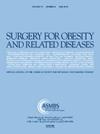高蛋白减肥饮食对预防术后恶心呕吐的影响。
IF 3.8
3区 医学
Q1 SURGERY
引用次数: 0
摘要
背景:术后恶心和呕吐(PONV)通常发生在代谢/减肥手术后,导致医疗保健利用率和住院时间(LOS)的增加。研究表明,以蛋白质为主的饮食对抑制胃心动过速和PONV有好处。目的:探讨高蛋白流质饮食对原发性袖胃切除术(SG)后PONV和LOS的影响。地点:美国大学医院。方法:这项前瞻性随机试验纳入了原发性SG的成年患者。排除标准为肥胖/前肠手术史、慢性恶心/呕吐、HbA1C≥9或治疗性抗凝。患者按1:1随机分组,从术后4小时开始接受透明液体(对照组)或高蛋白全液体饮食(干预组)。主要终点是PONV的发生率。次要终点是PONV导致的LOS增加。皮尔逊卡方独立性检验在治疗意向基础上比较各组之间的结果。结果:随机选取112例患者(对照组56例,干预组56例)。患者以女性为主(80.4%)。所有患者接受腹腔镜麻醉(72.3%)或机器人麻醉(27.7%),90.2%接受吸入麻醉。在干预组中,15例患者因PONV而蛋白质摄入量为零,6例数据缺失,35例平均摄入量为24.2克。未观察到PONV的治疗效果(对照组78.6%,干预组89.3%;P = .20)。近70%的患者在术后1天(POD)出院。PONV导致的延迟出院在两组间无显著性差异(对照组32.1% vs干预28.6%;P = .84)。结论:SG术后早期引入液体蛋白并不能改善PONV或LOS。本文章由计算机程序翻译,如有差异,请以英文原文为准。
Impact of high-protein bariatric diet on the prevention of postoperative nausea and vomiting
Background
Postoperative nausea and vomiting (PONV) commonly occurs following metabolic/bariatric surgery, contributing to increased health care utilization and length of stay (LOS). Studies have suggested the benefit of protein-predominant meals in suppressing gastric tachyarrhythmia and PONV.
Objective
To investigate the impact of a high-protein postoperative liquid diet on PONV and LOS after primary sleeve gastrectomy (SG).
Setting
University Hospital, United States.
Methods
This prospective randomized trial included adult patients undergoing primary SG. Exclusion criteria were history of bariatric/foregut surgery, chronic nausea/vomiting, HbA1C ≥9, or therapeutic anticoagulation. Patients were randomized 1:1 to receive a clear liquid (control) or high-protein full-liquid diet (intervention) starting 4 hours postoperatively. The primary endpoint was incidence of PONV. Secondary endpoint was increased LOS due to PONV. Pearson’s chi squared test for independence compared outcomes between groups on an intention to treat basis.
Results
One-hundred and twelve patients were randomized (56 control, 56 intervention). Most patients were female (80.4%). All underwent laparoscopic (72.3%) or robotic (27.7%) SG and 90.2% received inhalational anesthesia. In the intervention arm, 15 patients had zero protein intake due to PONV, 6 had missing data, and 35 had a mean intake of 24.2 grams. There was no observed treatment effect on PONV (78.6% control versus 89.3% intervention; P = .20). Almost 70% of patients were discharged home on postoperative day (POD) 1. Delay in discharge due to PONV was not significant between groups (32.1% control versus 28.6% intervention; P = .84).
Conclusions
Early introduction of liquid protein after SG does not improve PONV or LOS.
求助全文
通过发布文献求助,成功后即可免费获取论文全文。
去求助
来源期刊
CiteScore
6.70
自引率
12.90%
发文量
570
审稿时长
56 days
期刊介绍:
Surgery for Obesity and Related Diseases (SOARD), The Official Journal of the American Society for Metabolic and Bariatric Surgery (ASMBS) and the Brazilian Society for Bariatric Surgery, is an international journal devoted to the publication of peer-reviewed manuscripts of the highest quality with objective data regarding techniques for the treatment of severe obesity. Articles document the effects of surgically induced weight loss on obesity physiological, psychiatric and social co-morbidities.

 求助内容:
求助内容: 应助结果提醒方式:
应助结果提醒方式:


